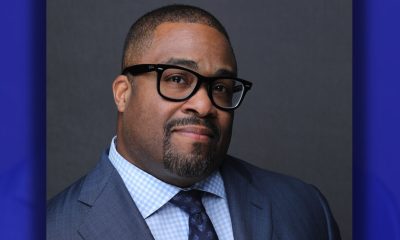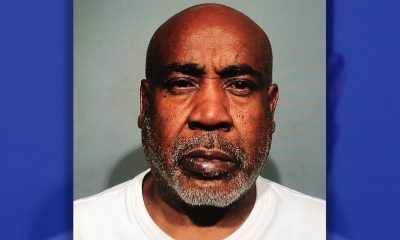National
Police Chief Who Pledged Reforms Fired Amid Crime Spike

In this April 30, 2015, file photo, Baltimore Police Department Commissioner Anthony Batts listens as Deputy Commissioner Kevin Davis speaks at a news conference, in Baltimore. Baltimore Mayor Stephanie Rawlings-Blake announced the firing of Batts in a news release Wednesday, July 8. (AP Photo/Patrick Semansky, File)
JULIET LINDERMAN, Associated Press
BALTIMORE (AP) — Less than three years ago, Anthony Batts was hand-picked by Baltimore Mayor Stephanie Rawlings-Blake to combat crime and reform a troubled law enforcement department in one of America’s most violent cities.
On Wednesday, Batts was fired as police commissioner amid the worst crime spike in the city since the 1970s and plummeting morale among officers who complained their boss was failing to provide the support and leadership they needed to do their jobs.
“We cannot continue to debate the leadership of the department,” Rawlings-Blake told a news conference she called to announce her decision. “We cannot continue to have the level of violence we’ve seen in recent weeks in this city.”
Deputy Police Commissioner Kevin Davis, who has only been with the department since January, will serve as interim commissioner, Rawlings-Blake said.
Batts and Rawlings-Blake are African-American, as is the city’s top prosecutor, Baltimore State’s Attorney Marilyn Mosby. Davis is white. Sixty percent of the city’s population is black, while the police department is 48 percent African-American. Mosby said her office has already met with Davis and she looks forward to working with him.
The firing comes less than three months after the city erupted in riots following the death of Freddie Gray, a 25-year-old black man who died in April of injuries he received in police custody. Six police officers have been criminally charged in Gray’s death. Gray died April 19. Most of the unrest took place on April 27.
The U.S. Justice Department is conducting a civil rights review of the department and Batts announced Tuesday that an outside organization would review the police response to the unrest.
But the Baltimore police union released a scathing post-mortem report Wednesday accusing Batts and other top brass of instructing officers not to engage with rioters and to allow looting and destruction to occur.
“The officers repeatedly expressed concern that the passive response of the Baltimore police commanders to the civil unrest allowed the disorder to grow into full-scale rioting,” Gene Ryan, president of the Baltimore Fraternal Order of Police Lodge 3, wrote in the report. “The riots were preventable.”
In the weeks after the riots, homicides and other violent crimes spiked and arrests began to plummet as word spread that police officers were afraid that they, too, would be charged with crimes if something went wrong during the course of their duties.
Baltimore’s homicide total this year is 156, according to police. That’s a 48 percent increase compared with the same time last year. Shootings have increased 86 percent.
In the latest example, gunmen jumped out of two vans and fired at a group of people a few blocks from an urban university campus Tuesday night, killing three people.
The startling spike stands in stark contrast to Batts’ promise to fight violent crime when he arrived in Baltimore in 2012.
At a swearing-in ceremony in November of that year, Batts pledged to “continue our progress at reducing violent crime and holding accountable those that perpetrate violence in our good streets.”
Batts took over from Fred Bealefeld, who resigned after five years as commissioner and 31 in the Baltimore Police Department. Batts too was a veteran officer, though new to the city of Baltimore: He spent three decades in California, two as commissioner of the embattled Oakland Police Department and seven as commissioner of the Long Beach police department, where he’d served as a law enforcement officer for 20 years.
“I worked closely with Commissioner Batts and always found him open to my ideas for reforming the department,” said Baltimore City Council President Bernard C. “Jack” Young. “He was engaging, experienced, and served our city to the best of his ability.”
But Young said that when he talked recently with citizens and police officers, “it became increasingly clear that a growing lack of confidence in the direction of our city’s crime-fighting strategy had the potential to severely damage the long-term health of our city.”
The Rev. Jamal Bryant, who delivered the fiery eulogy at Gray’s funeral, called Batts’ firing a first step toward healing police-community relations.
“It’s no secret there’s been great strain and stress since the uprising,” he said. “It became not just a disconnect between police and the community but between the police and their commissioner.”
In the Sandtown-Winchester neighborhood of West Baltimore, where Gray was arrested, residents praised the mayor’s decision.
Keonna Stokes, 22, said she was glad to see Batts removed from his position, and hopes a new commissioner will have a lower tolerance for police misconduct.
“The police wouldn’t do the things they do if the commissioner didn’t allow it,” she said. “He should have been fired. We call the police when we really need them, when people hurt us. But now we don’t call them, because they hurt us. If they didn’t, Freddie would still be here.”
Batts’ contract with the city paid him $190,000 and was to run through June 2020. It includes a provision for a severance payment equal to his annual salary if he is terminated without cause.
Copyright 2015 The Associated Press. All rights reserved. This material may not be published, broadcast, rewritten or redistributed.
Activism
Oakland Post: Week of April 17 – 23, 2024
The printed Weekly Edition of the Oakland Post: Week of April 17 – 23, 2024

To enlarge your view of this issue, use the slider, magnifying glass icon or full page icon in the lower right corner of the browser window. ![]()
Barbara Lee
Congresswoman Barbara Lee Issues Statement on Deaths of Humanitarian Aid Volunteers in Gaza
On April 2, a day after an Israeli airstrike erroneously killed seven employees of World Central Kitchen (WCK), a humanitarian organization delivering aid in the Gaza Strip, a statement was release by Rep. Barbara Lee (D-CA-12). “This is a devastating and avoidable tragedy. My prayers go to the families and loved ones of the selfless members of the World Central Kitchen team whose lives were lost,” said Lee.

By California Black Media
On April 2, a day after an Israeli airstrike erroneously killed seven employees of World Central Kitchen (WCK), a humanitarian organization delivering aid in the Gaza Strip, a statement was release by Rep. Barbara Lee (D-CA-12).
“This is a devastating and avoidable tragedy. My prayers go to the families and loved ones of the selfless members of the World Central Kitchen team whose lives were lost,” said Lee.
The same day, it was confirmed by the organization that the humanitarian aid volunteers were killed in a strike carried out by Israel Defense Forces (IDF). Prior to the incident, members of the team had been travelling in two armored vehicles marked with the WCF logo and they had been coordinating their movements with the IDF. The group had successfully delivered 10 tons of humanitarian food in a deconflicted zone when its convoy was struck.
“This is not only an attack against WCK. This is an attack on humanitarian organizations showing up in the direst situations where food is being used as a weapon of war. This is unforgivable,” said Erin Gore, chief executive officer of World Central Kitchen.
The seven victims included a U.S. citizen as well as others from Australia, Poland, the United Kingdom, Canada, and Palestine.
Lee has been a vocal advocate for a ceasefire in Gaza and has supported actions by President Joe Biden to airdrop humanitarian aid in the area.
“Far too many civilians have lost their lives as a result of Benjamin Netanyahu’s reprehensible military offensive. The U.S. must join with our allies and demand an immediate, permanent ceasefire – it’s long overdue,” Lee said.
Commentary
Commentary: Republican Votes Are Threatening American Democracy
In many ways, it was great that the Iowa Caucuses were on the same day as Martin Luther King Jr. Day. We needed to know the blunt truth. The takeaway message after the Iowa Caucuses where Donald Trump finished more than 30 points in front of Florida Gov. De Santis and former South Carolina Governor Nikki Haley boils down to this: Our democracy is threatened, for real.

By Emil Guillermo
In many ways, it was great that the Iowa Caucuses were on the same day as Martin Luther King Jr. Day.
We needed to know the blunt truth.
The takeaway message after the Iowa Caucuses where Donald Trump finished more than 30 points in front of Florida Gov. De Santis and former South Carolina Governor Nikki Haley boils down to this: Our democracy is threatened, for real.
And to save it will require all hands on deck.
It was strange for Iowans to caucus on MLK day. It had a self-cancelling effect. The day that honored America’s civil rights and anti-discrimination hero was negated by evening.
That’s when one of the least diverse states in the nation let the world know that white Americans absolutely love Donald Trump. No ifs, ands or buts.
No man is above the law? To the majority of his supporters, it seems Trump is.
It’s an anti-democracy loyalty that has spread like a political virus.
No matter what he does, Trump’s their guy. Trump received 51% of caucus-goers votes to beat Florida Gov. Ron DeSantis, who garnered 21.2%, and former South Carolina Gov. Nikki Haley, who got 19.1%.
The Asian flash in the pan Vivek Ramaswamy finished way behind and dropped out. Perhaps to get in the VP line. Don’t count on it.
According to CNN’s entrance polls, when caucus-goers were asked if they were a part of the “MAGA movement,” nearly half — 46% — said yes. More revealing: “Do you think Biden legitimately won in 2020?”
Only 29% said “yes.”
That means an overwhelming 66% said “no,” thus showing the deep roots in Iowa of the “Big Lie,” the belief in a falsehood that Trump was a victim of election theft.
Even more revealing and posing a direct threat to our democracy was the question of whether Trump was fit for the presidency, even if convicted of a crime.
Sixty-five percent said “yes.”
Who says that about anyone of color indicted on 91 criminal felony counts?
Would a BIPOC executive found liable for business fraud in civil court be given a pass?
How about a BIPOC person found liable for sexual assault?
Iowans have debased the phrase, “no man is above the law.” It’s a mindset that would vote in an American dictatorship.
Compare Iowa with voters in Asia last weekend. Taiwan rejected threats from authoritarian Beijing and elected pro-democracy Taiwanese vice president Lai Ching-te as its new president.
Meanwhile, in our country, which supposedly knows a thing or two about democracy, the Iowa caucuses show how Americans feel about authoritarianism.
Some Americans actually like it even more than the Constitution allows.
About the Author
Emil Guillermo is a journalist and commentator. He does a mini-talk show on YouTube.com/@emilamok1.
-

 Activism4 weeks ago
Activism4 weeks agoOakland Post: Week of March 20 – 26, 2024
-

 #NNPA BlackPress3 weeks ago
#NNPA BlackPress3 weeks agoCOMMENTARY: D.C. Crime Bill Fails to Address Root Causes of Violence and Incarceration
-

 #NNPA BlackPress3 weeks ago
#NNPA BlackPress3 weeks agoMayor, City Council President React to May 31 Closing of Birmingham-Southern College
-

 #NNPA BlackPress3 weeks ago
#NNPA BlackPress3 weeks agoCOMMENTARY: Lady Day and The Lights!
-

 #NNPA BlackPress3 weeks ago
#NNPA BlackPress3 weeks agoFrom Raids to Revelations: The Dark Turn in Sean ‘Diddy’ Combs’ Saga
-

 #NNPA BlackPress3 weeks ago
#NNPA BlackPress3 weeks agoBaltimore Key Bridge Catastrophe: A City’s Heartbreak and a Nation’s Alarm
-

 #NNPA BlackPress3 weeks ago
#NNPA BlackPress3 weeks agoBaltimore’s Key Bridge Struck by Ship, Collapses into Water
-

 Activism3 weeks ago
Activism3 weeks agoOakland Post: Week of March 27 – April 2, 2024


















































